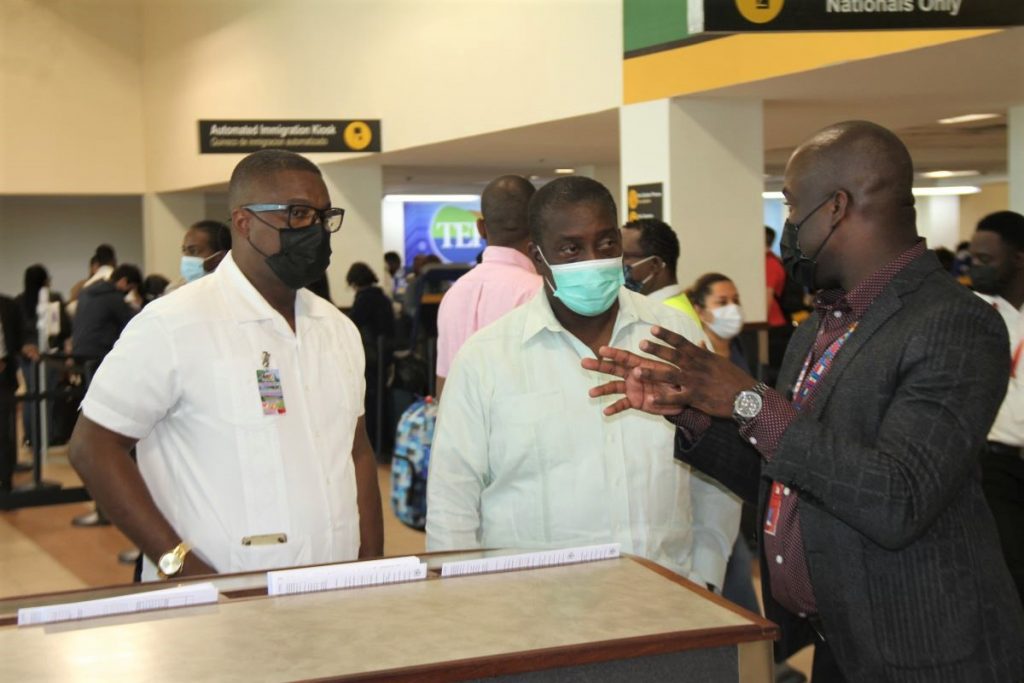It’s every airline passenger’s dream: Check-in on your mobile device then whisk past long lines in the packed terminal and head straight to the airplane, all without the need to pass physical documents back and forth with airport staff. It’s coming to the Sangster International Airport (SIA).
“Our main challenge post-COVID-19 is restoring passenger confidence. Persons want to feel like it’s safe to travel. And part of this is driving our push towards biometrics, and really that is to improve the passenger journey. Persons want things that are more seamless, touchless,” said Shane Munroe, CEO of MBJ Airports Ltd (MBJ), which operates SIA.

“We’re talking about the entire passenger journey… [This means] being able to check in… off-site,” he added during a sit-down to discuss the details of SIA’s US$100-million expansion project and what’s next for the airport in the coming year.
By winter 2022 — the date Munroe gave for the biometrics pilot to be rolled out — the new system will get passengers as far as security. The long-term plan is to eventually get them all the way to their seats on the aircraft. It will all hinge on a biometrics system that uses facial recognition to open electronic gates (e-gates). Passengers will need to lower their masks to have their facial images captured at one of 60 self-service kiosks but, as Munroe hastened to point out, that is no different from the approach now being used. Plus, he is looking ahead to a time when COVID-19 is no longer a major threat and masks are a thing of the past.
Munroe also stressed that there are no job losses anticipated with the introduction of the tech-heavy system which, while heavily used globally, is new to Jamaica at this level. There was a dry run with passengers from a cruise ship just before the novel coronavirus hit in 2020, but the pilot that will become available next year is on a much larger scale.
This will be a major change for Jamaica and it will require, according to Munroe, “a significant investment”.
“We are talking [about] the technology that has to tie the different processes together, integrate with border entry-and-exit systems and airline systems,” said the MBJ CEO.

He was unable to provide a price tag because aspects of the project are still being determined.
“Our focus right now is to get into design specifications. We will go through a procurement process starting in the first quarter of 2022 and select a suitable vendor that can implement this technology,” added Munroe.
He does not anticipate any challenge finding a vendor from among the ones whose services are already being used internationally.
“Work has already started in terms of defining how the system will work, and the specification that will feed into the request for proposal process that we will launch to select a suitable vendor,” he told LetsTravelCaribbean.com.
In a world where data security is a hot topic, landing the right vendor who is able to maintain the integrity of the system once it is up and running will be crucial. Munroe is confident that there is no cause for concern. The industry, he said, already has heavily regulated standards “for electronic travel documents and the use of biometrics in passenger processing”. There are also regulations by International Air Transport Association (IATA), the agency that represents airlines, the Jamaican Government has regulations in place and there are strong rules in place by various countries whose citizens cross Jamaica’s borders, he noted.
“It’s not that we are not used to operating at that level… Once we define the specifications properly, I don’t see that as a challenge. Our partners that we work with — with the systems at this level —take data protection and cybersecurity very seriously,” he said.
Travellers may feel an added sense of security when they learn of MBJ’s ongoing effort to get ISO certified in cybersecurity. This “new initiative for MBJ” began in late 2021 and is expected to be completed in 2023. Stressing that the airport already maintains high levels of cybersecurity, Munroe explained that certification simply adds to its ability to compete. The SIA is the largest of the country’s three international airports and roughly 95 per cent of its passengers are travelling internationally.

“We have always operated at a very high level in this space. We fall under a group of companies that’s also publicly listed on the NYSE [New York Stock Exchange] and there are certain regulations that we have to meet in this space already,” he said.
MBJ is jointly owned by Mexican (74.5 per cent) and Canadian (25.5 per cent) firms that also manage 20 other airports in five countries around the world.
“This just takes it to a next step. It’s a competitive advantage for MBJ as well to have that level of accreditation or recognition from an independent external body,” said Munroe.
Any extra safeguard helps, especially as the goal is to eventually expand the biometrics system to include arriving passengers.
“Our focus really will be firstly on the departures journey, but our long-term goal is to integrate on the arrival side of course. We’re talking about PICA [Passport, Immigration and Citizenship Agency] here. We believe there’s an opportunity to do a full integration of this type of technology from the time a visitor enters the country through to the time that he leaves. So, that is our goal,” said Munroe.
































































































































































































































































